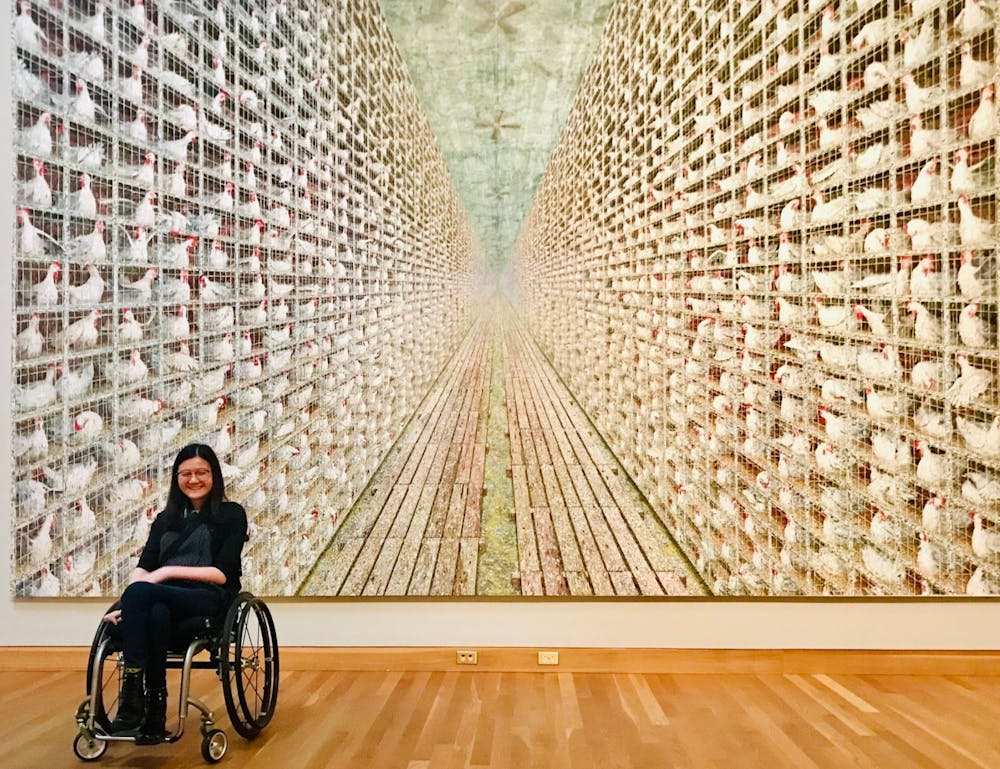Invisible opportunities: Reframing accessibility at Rice

When I read last December’s Thresher news article, “Invisible Burdens,” and the accompanying staff editorial, highlighting the apparent lack of accessibility on campus, I was disappointed, a bit angered and saddened. Reading that Thresher editorial that day was the first and only time I have felt alone and completely misunderstood at Rice. I did not want to identify with the kind of “disability” the editorial portrayed. I felt alienated. I felt guilty. I felt ashamed. As a wheelchair user and someone living with a disability, that was not the experience I had received on campus, nor was it the voice of real advocacy.
I felt the Thresher painted an incomplete picture by reporting only from a few students,
and subsequently, failed to report that accessibility is different for everyone, and solving it, let
alone defining it, is a complex, multifaceted issue. And to actually address these issues around campus, we need to openly acknowledge these differences.
How do we define accessibility? I’m not sure there’s a perfect answer, and some may discredit this letter because of that, but maybe that’s the point — maybe accessibility will forever be a gray area. There are no laws or rules or regulations that can adequately address and mend every obstacle. Rather, true accessibility is the openness and willingness to embrace change. Everyone here, from staff to professors to students, has had such an incredibly open and willing attitude toward addressing accessibility and accommodations that I have felt wholly accepted and appreciated. True accessibility is accepting individuals as they are, and true advocacy is honoring and creating space for all to thrive.
Exposing Rice’s accessibility issues in a critical and instigatory manner is no better than being exclusionary in the first place. If we speak harshly of disappointment and critique, should we not expect to get those in return? If the Rice community is given only criticism in response to their attempts to make our campus more accessible, I worry that we, the disabled community, further isolate and alienate ourselves.
Instead of guilt and hostility, let’s have a conversation. Let’s sit down and share our stories and experiences. We need to communicate what does and does not work, what is accessible and what is not. And we must do so in an organized and constructive manner, not one that is meant to elicit a guilt or pity response from a supposed victim-oppressor situation. Because these situations are exclusionary, they draw lines instead of erasing them.
In the end, I want to express my feelings of gratitude and appreciation toward Rice in
regard to their accessibility on campus. There are countless individuals that have helped make
my transition to college and greater independence a resounding success. I am thriving here,
despite my physical challenges, and I hope the Rice community knows that. I strongly believe we can make our campus better by sharing and listening to each other’s experiences, and then, building collaboratively off of what we’ve accomplished and creatively improving what still needs to be fixed. We need to acknowledge that we aren’t perfect and we cannot solve every accessibility burden; instead, we need to foster open dialogue and willingness to ensure progressive changes. We must retain the attitude to try and keep trying.
The purpose of this letter is not to minimize the voices who spoke out in the “Invisible
Burdens” article, but rather to offer the Rice community a different opinion on campus
accessibility and how I believe we can make impactful, meaningful and lasting change. I would
be more than happy to share my experiences with you in person — whether you’re concerned,
curious, or just want to know more. Be willing to embrace change and be brave enough to engage in dialogue. Remember, it’s okay to ask!
More from The Rice Thresher
This moment may be unprecedented — Rice falling short is not
In many ways, the current landscape of American higher education is unprecedented. Sweeping cuts to federal research funding, overt government efforts to control academic departments and censor campus protests and arbitrary arrests and visa revocations have rightly been criticized as ushering in the latest iteration of fascism.
This moment may be unprecedented — Rice falling short is not
In many ways, the current landscape of American higher education is unprecedented. Sweeping cuts to federal research funding, overt government efforts to control academic departments and censor campus protests and arbitrary arrests and visa revocations have rightly been criticized as ushering in the latest iteration of fascism.
Obituary for D’Brickashaw Eagleclaw Ibarra
D’Brickashaw Eagleclaw Ibarra, nicknamed DEI, has transitioned to the ancestral plane.


Please note All comments are eligible for publication by The Rice Thresher.